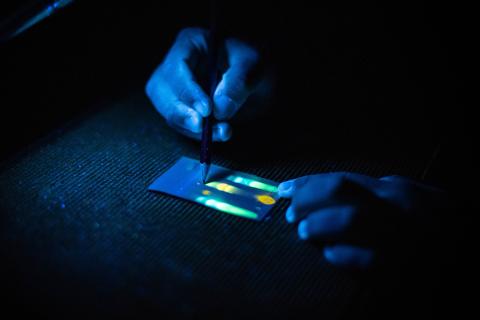Exhibitionism: The Textiles of Byzantium
Every year, the libraries host culture-spanning exhibitions, and with a trio of exhibitions on the gallery roster, this academic year is no exception.
The Byzantine textile began life as a collection of fibers that was artfully dyed and woven more than 1,000 years ago. In a new, year-long 360°, students have been using scientific technologies and rigorous scholarship to unthread the secrets of these ancient pieces of cloth. A joint offering by Special Collections and the history of art department, the 360° cluster—called Textiles in Context: Analysis, Interpretation, and Exhibition—began last semester with two courses: a chemistry course taught by Collections Manager Marianne Weldon and a history of art course taught by Professor Alicia Walker ’94.
Weldon’s class, Analysis of Art: Early Byzantine Textiles, focused on the science of textiles. Using sophisticated technology—thin-layer chromatography, liquid chromatography, mass spectrometry, X-ray florescence spectroscopy, and polarized light microscopy—students learned to identify fibers, weave structures, and make dyes and mordents. Armed with that knowledge, they were able to pinpoint the methods used in the production of an authentic early Byzantine textile.
Byzantine Textiles in Life, Death, and Afterlife—Walker’s class—explored questions of historical interpretation. How did these textiles signify social status and individual and group identities? How did the iconography employed relate to cultural and religious values? What role did these objects play in local production and long-distance trade in a pre-modern “globalized” system? In addition, students explored the fraught history of the excavation, collection, sale, and display of these textiles in the modern and contemporary eras.
This spring, students are marshaling all they’ve learned to mount an exhibition featuring some 20 Byzantine textiles—most of them fragments—on loan from Thomas Jefferson University. The show will be the culminating project of the third offering in the 360°: Topics in Exhibition Strategies: Byzantine Textiles, co-taught by Walker and Carrie Robbins. Already students have begun visiting and researching previous exhibitions as case studies and also reading catalogues and critical responses to understand the different curatorial strategies they might apply to their own work. Soon, they’ll be developing original documentation of objects for online entries to Jefferson Digital Commons, a publicly accessible collection database. And as the semester continues, they’ll refine their curatorial agenda and create the essentials of an exhibition—didactic materials, public programs, and tour scripts for different audiences.
The exhibition will open in spring and run through Reunion. Costs are being underwritten by the Friends of the Bryn Mawr College Libraries.
Published on: 03/07/2019
